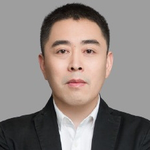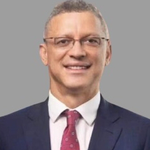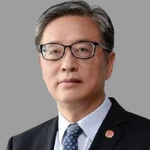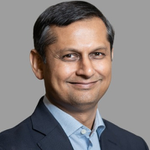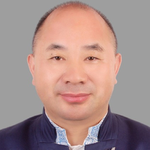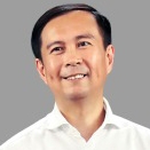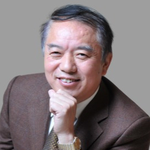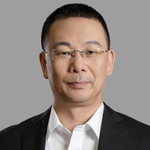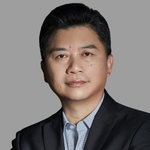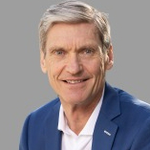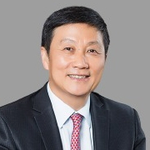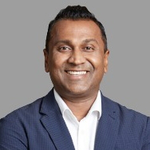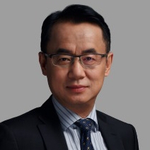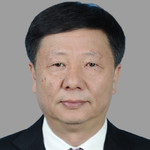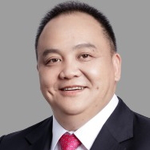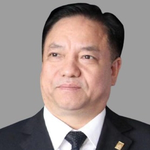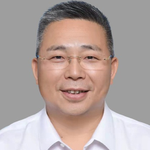- REGISTRATION OPENS
- WELCOMING REMARKS
Clay Chandler - Remarks by the Government of Hangzhou
- Remarks by the Government of Zhejiang Province
- Introducing the Agenda
Derek Zhang - ONE ON ONE: The Role of the Economy in a Low-carbon World
Leslie Maasdorp•Clay Chandler - ONE ON ONE: A New Path for Economic Development
Guangshao Tu•Derek ZhangAfter over 30 years of rapid development, China is now the world’s second-largest economy—and home to a number of Fortune Global 500 companies. Faced with a once-in-a-century period of major change, China is shifting its economic growth path from speed-first to quality-first, with the improvement of total factor productivity as its goal. Equipped with advanced ideas and concepts, China is embarking on a new path. As we look into the future, how should we interpret the paths and drivers in China’s new economic model?
Guangshao TU, Adjunct Professor at Shanghai Jiao Tong University, Executive Director of Shanghai Advanced Institute of Finance (SAIF)
Interviewer: Maiwen ZHANG, Executive Editor, Fortune China - ONE ON ONE: The Power of Entrepreneurial Spirit and Culture
“You slept on the floor yesterday, but you could be a big boss today.” This popular saying is often used to describe the entrepreneurial spirit of Zhejiang Province. These entrepreneurs have strived for the best amid the ups and downs of business. As a place devoted to developing its private sector, Zhejiang Province closely connects its economy and culture with entrepreneurial spirit. How can such a approach be shaped so that it can play a larger role in the new era?
Qinghou ZONG, Founder, Hangzhou Wahaha Group Co.,Ltd.
Interviewer: Fang WANG, Executive Editor, Shanghai, Fortune China - ONE ON ONE: Leadership in the New Era
Neeraj AggarwalThe global information revolution has continued to transform the world economy. Political, economic, and trade patterns have been restructured. Business leaders are in a situation of unprecedented change in a century and face many novel challenges. In today's uncertain world, the global leadership of Fortune 500 companies has become particularly important.
Neeraj AGGARWAL, Managing Director & Senior Partner, Chairman of Asia-Pacific, BCG(Virtual)
Interviewer: Clay CHANDLER, Executive Editor, Asia, Fortune - ONE ON ONE: People, not tech: the path to digital transformation
Julie SweetDigital transformation is a key part of any contemporary corporate strategy. But actually integrating new technologies into how a company operates requires change throughout the organization. What skills do companies need to grow among their talent, not just to improve efficiency, but also to build a more sustainable future?
Julie SWEET, Chief Executive Officer, Accenture(Virtual)
Interviewer: Alan MURRAY, CEO, Fortune(Virtual) - NETWORKING BREAK
- ONE ON ONE: The Global Role of Private Enterprises
Wenyin WangAgainst the backdrop of the Belt and Road Initiative, state-owned enterprises in resources and infrastructure have often joined hands when investing in overseas development. It’s far from easy for many private enterprises to make risky overseas mergers and acquistitions, or get deeply involved in global industries. How can growing private enterprises cope with a complicated global market? What can Chinese private enterprises learn from the overseas experience? Join to hear the views and inishgts from the “helmsman” of a Fortune Global 500 company with numerous holdings of overseas mineral resources.
Wenyin WANG, Chairman of the Board, Amer International Group
Interviewer: Ye LIU, Bilingual Anchor, CBN - PANEL DISCUSSION: A More Resilient Global Supply Chain
Craig Burchell•Bo Feng•Clay Chandler•Jens EskelundThe stranding of the Ever Given in the Suez Canal showed how a minor issue can lead to major problems in global supply chains. And yet supply chains are faced with even greater challenges, from the COVID-19 pandemic to mounting geopolitical tensions. In this more complicated era, how can companies build a future-oriented supply chain management system? Is “Just-in-Time” still appropriate? And how can we create a supply chain that can withstand a “black swan” event?
Craig BURCHELL, Senior Vice President Global Government Affairs, Huawei Technologies Co. Ltd
Jens ESKELUND, Managing Director, Maersk China
Bo FENG, Executive Vice President and Party Committee Member,China COSCO SHIPPING Corporation Limited
Moderator: Clay CHANDLER, Executive Editor, Asia, Fortune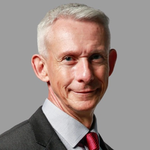
Craig Burchell
Senior Vice President Global Government Affairs, Huawei Technologies Co. Lt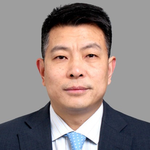
Bo Feng
Executive Vice President and Party Committee Member of China COSCO SHIPPING Corporation Limited (COSCO SHIPPING)
Clay Chandler
Executive Editor, Asia at FORTUNE
Jens Eskelund
Managing Director, Maersk China Limited
- PANEL DISCUSSION: Leaders of the Moment: Large Enterprises, Large Responsibilities
Alex Gorsky•Fan Fu•Alex Gu•Chun Wu•Ying YangWhen the COVID pandemic hit, companies from the medical and other sectors stepped forward to help overcome the pandemic. The lessons they learned in countering COVID-19 may now end up becoming a driving force in reshaping the world. What drove these companies to take charge during this crisis? And can they now help chart a post-pandemic future?
ONE ON ONE
Alex GORSKY, Chief Executive Officer, Johnson & Johnson(Virtual)
Interviewer: Alan MURRAY, CEO, Fortune(Virtual)
PANEL DISCUSSION
Fan FU, Chairman, China Pacific Insurance Co., Ltd
Alex GU, Senior Vice President and President of Medtronic Greater China
Chuyuan LI, Chairman, CPC Party Secretary of Guangzhou Pharmaceutical Holdings Limited
Ying YANG, Pfizer Vice President, Worldwide Business Development Asia Lead
Moderator: Chun WU, Managing Partner, BCG Greater China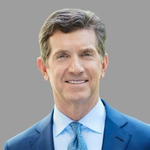
Alex Gorsky
Chief Executive Officer, Johnson & Johnson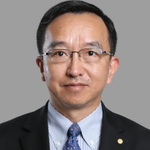
Fan Fu
Executive director and president of China Pacific Insurance (Group) Co, Ltd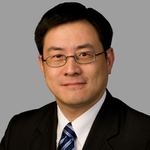
Alex Gu
Senior Vice President and President of Medtronic Greater China
Chun Wu
Managing Partner of BCG Greater China
Ying Yang
Pfizer Vice President, Worldwide Business Development Asia Lead
- LUNCH
- ONE ON ONE: the Digital Economy is Reshaping the Post-Pandemic World
Clay Chandler•Daniel Zhang - PANEL DISCUSSION: Survive and Thrive: Manufacturing in the Digital Age
Jianguo Cao•Fang Wang•Simon Zhang•张志祥Manufacturing has been a major force driving global economic development. Yet new technologies pose fresh challenges to manufacturing companies. How can manufacturing continue to survive and thrive in this new age?
Jianguo CAO, Chairman of the Board, Hailiang Group
Cheng WANG, Chairman, Anhui Conch Holdings Co., Ltd.
Zhixiang ZHANG, Chairman, Jianlong Group
Simon ZHANG, Vice-president and the Chief Information Officer (CIO), Midea Group
Moderator: Fang WANG, Executive Editor, Shanghai, Fortune China - ONE ON ONE: Charting a New Course
Chuck Robbins - PANEL DISCUSSION: International Brands and the New Norm
Angela Dong•Pan Li•Adele Tao•Ray Zhu•Cindy TaiThe Chinese market presents unique challenges, as many multinational companies struggle to get a foothold in the country. Geopolitical tensions have also threatened to complicate how international brand presence in China is seen. What have the leaders of successful multinational companies in China learned about the Chinese market? How have they tailored their message to this unique environment? And what can they share about the international market?
Angela DONG, Vice President, Nike Inc., General Manager of NIKE Greater China
Pan LI, Vice President of Haier Group and General Manager of Haier Overseas Market
Cindy TAI, Global Vice President, Executive President of Amazon Global Store Asia Pacific Region
Adele TAO, Leader, LIXIL Water Technology (LWT) - Greater China
Moderator: Ray ZHU, Partner, PwC China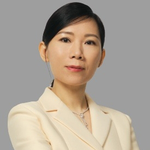
Angela Dong
Vice President of Nike Inc. and General Manager of Nike Greater China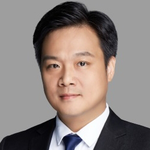
Pan Li
Vice President of Haier Group and General Manager of Haier Overseas Market
Adele Tao
Leader, LIXIL Water Technology (LWT) - Greater China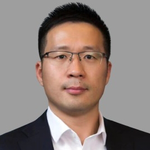
Ray Zhu
Corporate tax partner in PwC China
Cindy Tai
Vice President of Amazon and Head of Asia Global Selling
- PANEL DISCUSSION: The Connective Power of Sports
Christina Li•Echo Li•Sebastian Lau•Genhong Mao•Chun WuSports has the power to connect people, bringing them together to celebrate human potential and enjoy friendly competition. In 2022, China will again be the host for the world’s best athletes in both the Winter Olympics and the Asian Games. What special preparations have been made for next year’s Asian Games in Hangzhou? How have leading companies helped with planning and implementation? And what can business do to improve the potential of global sports?
Christina LI, Vice President of Corporate Affairs, Anta Group
Echo LI, Managing Director for Greater China & Global Senior Vice President, SPORTFIVE
Genhong Mao, Deputy Secretary General of Hangzhou Municipal Government, Director of the Office of the Municipal Asian Games Committee
Zhao LIU, Director General, AESF
Moderator: Ye LIU, Bilingual Anchor, CBN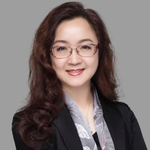
Christina Li
Vice President of Corporate Affairs, Anta Group
Echo Li
Managing Director, Greater China & Senior Vice President at SPORTFIVE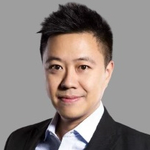
Sebastian Lau
Director-General of the Asian Electronic Sports Federation (AESF)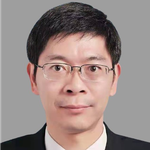
Genhong Mao
Deputy Secretary General of Hangzhou Municipal People’s Government, Deputy Secretary General and Director of the Executive Office of the 19th Asian Games Organising Committee (HAGOC)
Chun Wu
Managing Partner of BCG Greater China
- ONE ON ONE: Food for Thought: Security, Seed Strategy and Smart Agriculture
Clay Chandler•Erik Fyrwald - NETWORKING BREAK
- PANEL DISCUSSION: Sustainability as Corporate Strategy
Jin Qian•Jason Thomas•Weiming Xiang•Derek Zhang•Hua ZhuLarge companies, due to their size and corporate power, have a great responsibility when it comes to protecting the planet and the environment. These corporate titans need to play a leading role when it comes to sustainable development. Can sustainability commitments act as a solid foundation for long-term business success?
Lujun QIU, Chairman, Yunnan Provincial Investment Holding Group
Jin QIAN, Area President of Hilton Greater China and Mongolia (GCM), Hilton
Jason THOMAS, Managing Director of Greater China, Adidas
Weiming XIANG, Vice President of GE, President of GE China
Moderator: Maiwen ZHANG, Executive Editor, Fortune China - PANEL DISCUSSION: Promoting Green Development and Low-Carbon in the Corporate World
Craig Katerberg•Christina Kong•Anmin Wang•Tony Xiong•Haimeng ZhangSustainable development has become a corporate imperative as populations become more aware of the balance between man and nature. Business will play a key role in the creation of a low-carbon society, and large companies will play a leading role in charting a path towards a green future. What experiences can leading companies share in promoting green development? And how have these achievements been received by wider society?
Craig Katerberg, Chief Legal and Corporate Affairs Officer, Budweiser APAC
Christina KONG, Senior Vice President and Market Head, Greater China, Ecolab
Anmin WANG, Deputy Chief Economist of China National Nuclear Corporation
Tony XIONG, Senior Vice President of Schneider Electric, Head of Strategy and Business Development in China
Moderator: Haimeng ZHANG, Senior Partner, McKinsey & Company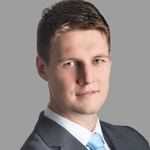
Craig Katerberg
Chief Legal & Corporate Affairs Officer of Budweiser APAC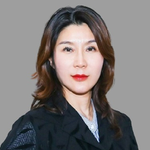
Christina Kong
Senior Vice President and Market Head, Greater China, Ecolab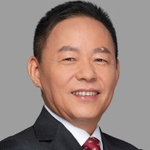
Anmin Wang
Deputy Chief Economist of China National Nuclear Corporation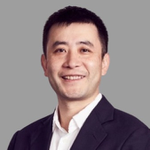
Tony Xiong
Senior Vice President of Schneider Electric, Head of Strategy and Business Development in China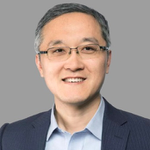
Haimeng Zhang
Senior Partner, McKinsey & Company
- ONE ON ONE: The Great Reset
Clay Chandler - PANEL DISCUSSION: Dealing with Disruption
Joe Bao•Yonghong Mei•Liangjie Zhang•Anqi Yang•周伯文A threat to an industry giant can come from anywhere—and, increasingly, from outside the industry. Disruptive technologies could upend the entire value chain of a given company. Even the disruptors of past decades now need to think about how to ward off potential challengers. When technology evolves at a record pace, how can major companies stay relevant?
Joe BAO, President, Microsoft China
Yonghong MEI, Group Vice President and Head of agricultural sector, Country Garden
Bowen ZHOU, Vice President of Jingdong Group and Director of Jingdong Artificial Intelligence Research Institute
Liangjie ZHANG, Senior Vice President, Kingdee
Moderator: Anqi YANG, New Media Associate Executive Editor, Fortune China
Joe Bao
President, Microsoft China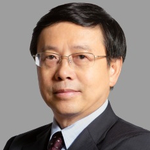
Yonghong Mei
Vice President of Country Garden Group,Chairman of Country Garden Agriculture Co., Ltd,Chairman of BGI Agriculture Group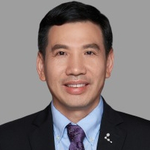
Liangjie Zhang
IEEE Fellow, Senior Vice President and Director of Kingdee Research at Kingdee International Software Group Co., Ltd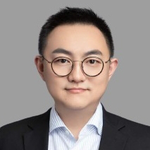
Anqi Yang
New Media Associate Executive Editor at FORTUNE China
周伯文
京东集团副总裁、京东人工智能研究院院长
- PANEL DISCUSSION: Zhejiang’s “Eagles”: How the Province’s Corporate Champions Soar and Succeed
Qihong Liu•Fang Wang•Weiming Xiang•Yuanbao Zheng•Zhenghong YangSince China joined the World Trade Organization in 2001, more and more Chinese companies have entered the ranks of Fortune’s Global 500. In 2019, Zhejiang Province introduced its “Eagle” program, committed to building top-level, globally-competitive companies in six sectors, including green energy, automotive manufacturing, and the digital economy. By 2022, Zhejiang hopes to have twenty companies with over RMB 100 billion in revenue, and six ranked among Fortune’s Global 500. How can these champions continue to innovate, and improve their branding, management and profitability on the global stage?
Weiming XIANG, Vice President of GE, President of GE China
Tingge WANG, Chairman, Wuchan Zhongda Group Co., Ltd
Qihong LIU, Chairman, Zhejiang Loong Airlines Co., Ltd
Jingjie ZHENG, Chairman, People Electric Appliance Group Co., Ltd
Moderator: Fang WANG, Executive Editor, Shanghai, Fortune China - Carbon Neutrality Target Initiative
- CLOSING REMARKS
Clay Chandler - COCKTAILS & AWARDS PRESENTATION
- FORTUNE DINNER
ONE ON ONE
19:30-19:45 mRNA Technology and Genes
The COVID-19 pandemic has brought mRNA technology into the public eye. It has become one of the newest buzzword of the capital markets, due to its potential for vaccines and anti-tumor therapies. What are the odds that society can beat COVID-19 using our existing biotechnology? What are the technical and even ethical hurdles that must be overcome? And, given our history of coexisting with and fighting disease over thousands of years, how should humanity examine its relationship with nature?
Ye YIN, Chief Executive Officer, BGI Group
Interviewer: Maiwen ZHANG, Executive Editor, Fortune China
ONE ON ONE
19:45-20:00 The Next Generation’s New Attitude Towards Life
Why try hard when you can just skate by? This perception about the next generation has sparked debate. For those worrying day-in, day-out about the economy, their family, and their wellbeing, it can feel hopeless not knowing what the future is like. How can we understand and interpret the mentality of the next generation?
Jilin XU, Professor of History, East China Normal University
Interviewer: Fang WANG, Executive Editor, Shanghai, Fortune China
